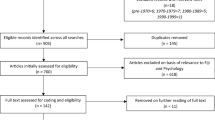Abstract
This chapter comments on commentaries on prospects for a more equitable Global Psychology as envisioned by Kuo-shu Yang. Yang was a quantitative empirical researcher, committed to quantitative survey methods even though he moved away from cross-cultural psychology toward indigenous psychology (IP). His instructive list of do’s and don’t provides a practical guide for constructing indigenous compatibility with decolonizing capabilities. He was committed to inductive research, where different IPs constituting semi-autonomous bodies of knowledge were to be integrated into a greater whole. As noted by commentators, especially Teo and Asfin, this aim is/was not realizable, given the power distribution in actually existing psychology. Yang was deeply committed to psychological science, and had no affinity for the emancipatory approaches advocated by Teo and Asfin, nor a focus on understanding poverty and its psychological correlates, as emphasized by Moghaddam and Kendricks. His goal to construct IP comprehensively suited for Chinese speaking peoples was not fully realizable. But he and his colleagues accomplished much in building a large body of both descriptive and theoretical knowledge, captured in 51 volumes of the journal Indigenous Psychological Research in Chinese Societies. Only time will tell how enduring the legacy of this scientific research will be.
Access this chapter
Tax calculation will be finalised at checkout
Purchases are for personal use only
Similar content being viewed by others
Notes
- 1.
There was also a very late commentary by Professor Richard Shweder, that engages even less with Professor Yang’s vision of GP, so I will touch on it in passing but not attempt a full commentary on his commentary.
- 2.
At least until (and if) the PRC becomes the hegemonic world power in the 2nd half of the twenty first century—but I’m pretty sure they won’t be calling whatever they do in Chinese psychology IP by then.
- 3.
Given such a platform for academic program development, academics cannot have much space for developing interest in the notions of rationality expounded by Shweder (this volume) as central to cultural psychology.
- 4.
Sadly, many mainland Chinese would not be able to read this research easily, as the mainland now uses simplified characters; but I believe there may be simple character versions of the papers available somewhere.
References
Allwood, C. M. (this volume). Yang’s global psychology and beyond.
Allwood, C. M., & Berry, J. W. (2006). Origins and development of indigenous psychologies: An international analysis. International Journal of Psychology, 41, 243–268.
Berry, J. W. (1989). Imposed etics-emics-derived etics: The operationalization of a compelling idea. International Journal of Psychology, 24, 429–450.
Carr, S. C., Maleka, M., Meyer, I., Barry, M. L., Haar, J., Parker, J., … Young-Hausner, A. (2018). How can wages sustain a living? By getting ahead of the curve. Sustainability Science (published online). https://doi.org/10.1007/s11625-018-0560-7.
Dueck, A., Song, R., & Marossy, M. (this volume). Forgiveness in indigenous psychological research: A Trojan Horse, a Western knockoff, or a traditioned sensibility?
Enriquez, V. G. (1992). From colonial to liberation psychology: The Philippine experience. Manila: De La Salle University Press.
Hwang, K.-K. (2003). Critique of the methodology of empirical research on individual modernity in Taiwan. Asian Journal of Social Psychology, 6, 241–262.
Hwang, K.-K. (2011). Foundations of Chinese psychology: Confucian social relations. New York: Springer.
Jahoda, G. (2016). On the rise and decline of ‘indigenous psychology’. Culture and Psychology, 22(2), 169–181.
Kim, U., Yang, K.-S., & Hwang, K.-K. (Eds.). (2006). Indigenous and cultural psychology: Understanding people in context. New York: Springer.
Lin, C.-P., & Sun, C.-R. (2017). The effect of significant other’s advice on forgiveness in Chinese culture. Indigenous Psychological Research in Chinese Societies, 48, 3–55.
Liu, J. H. (2017). Neo-Confucian epistemology and Chinese philosophy: For actioning psychology as a human science. Asian Journal of Social Psychology, 20, 137–149. https://doi.org/10.1111/ajsp.12168.
Liu, J. H., Fisher Onar, N., & Woodward, M. (2014). Symbologies, technologies, and identities: Critical junctures theory and the multi-layered nation-state. International Journal of Intercultural Relations, 43, 2–12. https://doi.org/10.1016/j.ijintrel.2014.08.012.
Liu, J. H., & Liu, S. H. (1997). Modernism, postmodernism, and Neo-Confucian thinking: A critical history of paradigm shifts and values in academic psychology. New Ideas in Psychology, 15(2), 159–177.
Liu, J. H., & Macdonald, M. (2016). Towards a psychology of global consciousness. Journal for the Theory of Social Behavior, 46(3), 310–334. https://doi.org/10.1111/jtsb.12101.
Moghaddam, F. T., & Hendricks, M. J. (this volume). Psychology for the global 99%.
Shweder, R. (this volume). The role of reason in cultural interpretation: Some Talmudic distinctions for indigenous and cultural psychology.
Teo, T., & Asfin, B. (this volume). The impossible conditions of the possibility of an alter-global psychology.
Yang, K.-S. (2000). Monocultural and cross-cultural indigenous approaches: The royal road to the development of a balanced global psychology. Asian Journal of Social Psychology, 3, 241–263.
Yang, K.-S. (2003). Methodological and theoretical issues on psychological traditionality and modernity research in an Asian society: In response to Kwang-Kuo Hwang and beyond. Asian Journal of Social Psychology, 6, 263–285.
Yang, K.-S. (2012). Indigenous psychology, Westernized psychology, and indigenized psychology: A non-Western psychologist’s view. Chang Gung Journal of Humanities and Social Sciences, 5(1), 1–32.
Yeh, K.-H. (Ed.). (2019). Asian indigenous psychologies in the global context. New York: Palgrave.
Zhang, R.-J., Liu, J. H., Milojev, P., Jung, J., Wang, S. F., Xie, T., … Morio, H. (2019). The structure of trust as a reflection of culture and institutional power structure: Evidence from 4 East Asian societies. Asian Journal of Social Psychology, 22(1), 59–73. https://doi.org/10.1111/ajsp.12350.
Author information
Authors and Affiliations
Corresponding author
Editor information
Editors and Affiliations
Rights and permissions
Copyright information
© 2020 The Author(s)
About this chapter
Cite this chapter
Liu, J.H. (2020). A Commentary on Commentaries on the Prospects for a More Equitable Global Psychology. In: Sundararajan, L., Hwang, KK., Yeh, KH. (eds) Global Psychology from Indigenous Perspectives. Palgrave Studies in Indigenous Psychology. Palgrave Macmillan, Cham. https://doi.org/10.1007/978-3-030-35125-0_11
Download citation
DOI: https://doi.org/10.1007/978-3-030-35125-0_11
Published:
Publisher Name: Palgrave Macmillan, Cham
Print ISBN: 978-3-030-35124-3
Online ISBN: 978-3-030-35125-0
eBook Packages: Social SciencesSocial Sciences (R0)




